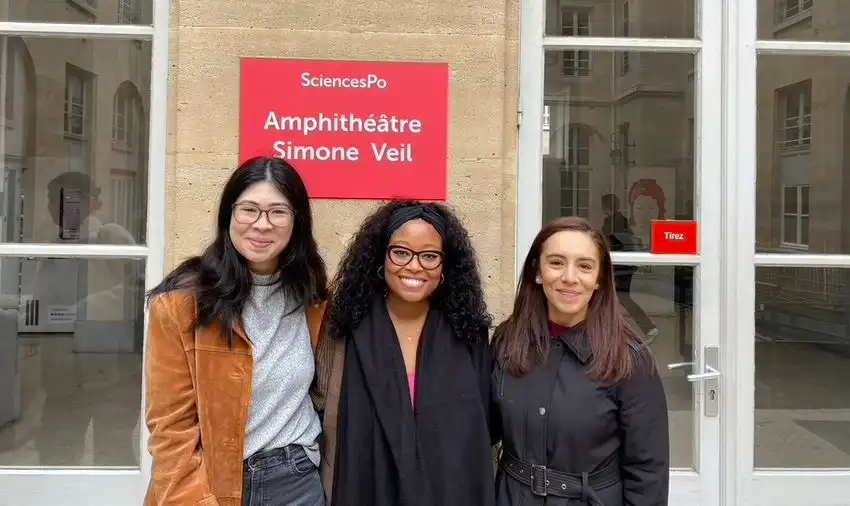Home>Meeting with Julia Vieira and Emma James, two students working on the Clinic projet "Digital identity and the right to opacity"
03.04.2023
Meeting with Julia Vieira and Emma James, two students working on the Clinic projet "Digital identity and the right to opacity"

Julia Vieira is a second >year student in Master in Economic law at Sciences Po Law School and Emma James is a first year student in Master in International Governance and Diplomacy at Sciences Po’s Paris School of International Affairs (PSIA). They work on the clinical project "Digital identity and the right to opacity" and share their experiences with us.
Why did you choose to apply for the DIGILAW clinic?
Julia: I applied to the DIGILAW Clinic in order to deepen my knowledge of the role of law in cyberspace. Additionally, I hoped to increase awareness on how the legal area can deal with the consequences of business practices related to cyberspace in society and democracy, and especially in relation to how marginalized communities can have their fundamental rights affected by the digital ecosystem today.
Emma: I applied for this clinic because I am interested in the governance of technology and the digital world. As I am not a part of the Law school, I thought this would be a great way to become more familiar with the legal aspects of technology governance.
Tell us about your clinic project?
Julia: I am part of the "Digital Identity and the Right to Opacity" project in partnership with the Institute for Technology in the Public Interest. The objective of the project is to create a product to foster discussion around the concept of digital identity and its impact on democracy. The project also seeks to consider how actors in the public, private and public-private spheres are impacted by power imbalances perpetuated by EU regulations related to privacy and the digital realm in the context of the concentration of power in today’s Big Tech companies. It was a positive experience to be able to actively collaborate with my teammates and have the freedom to contribute to the design of the project from the beginning, keeping in mind the goals of the partner.
Emma: We are working with our partner, the Institute for Technology in the Public Interest, to create a pamphlet higlighting the complexities of digital identity today. Our partner did not have a specific deliverable in mind at the beginning, so it was a fantastic opportunity to come up with an idea for the project that was unique and will encapsulate the issues our partner is hoping to shed light on through our research. In the end, we have chosen three case studies through which we can look at the intersection of law and digital identity, and are tackling both the public sphere, the business/private sphere and areas that deal with public-private interactions.
What are your professional plans?
Julia: I am about to finish my masters in Economic Law, with a focus on Global Governance Studies. Thanks to the Clinic, I have decided to pursue a career in the technology sector,as an in-house lawyer. I want to develop practical expertise from a different standpoint. The clinic project has been an important tool for my professional goals due to the skills I have been able to develop throughout the year. The critical and interdisciplinary aspects were fundamental for me to better understand how technology works and all the areas it can impact. From a professional standpoint, I am looking forward to seeing the outcomes of the DMA, DSA and AI Act’s application.
Emma: In the future, I would like to work in the area of technology regulation and governance. My clinical experience has been very helpful in giving me a legal and critical background to AI, data and digital identity. I now feel like I understand these technologies in much more depth, as well as the legal elements behind them. I belive that this will be very relevant for my future career.
What advice would you give to a student interested in the Law Clinic?
Julia: I would highly recommend the DIGILAW clinic to students who want to learn and formulate ideas (and work hard!) to develop a more equal and fair society when dealing with the digital world. The clinic would be especially appealing to those who are not only interested in looking at the relevant laws and regulations, but also the social, economic and political implications of the ever-changing challenges technology presents.
Beyond the practical aspects of the project, it was enriching being able to attend the mandatory course in “AI and Data Governance” with the amazing professor, Beatriz Botero Arcila. I learned so much from her course that I decided to enroll in another course, “Cyberlaw in times of crisis” with her this semester (which I also recommend!). Finally, I need to highlight the wonderful clinic teaching team: Ayse Gizem Yasar, Raphaële Xenidis and Lucas Costa dos Anjos as well as Ana Muñoz, my project tutor, for their encouragement and guidance.
Emma: If you are not part of Sciences Po’s Law school but are still interested in applying, don’t let that hold you back! Despite having no legal background prior to being accepted to the Clinic, my professors and classmates have been very helpful in filling me in on aspects of the law I was unfamiliar with, and we have all learned so much about AI and Data Law, as well as laws related to digital identity.
Information Sessions: Masters

Find out more about the Masters programs and the wide choice of specialisations offered by the 8 Schools of Sciences Po during our webinars dedicated to applicants.